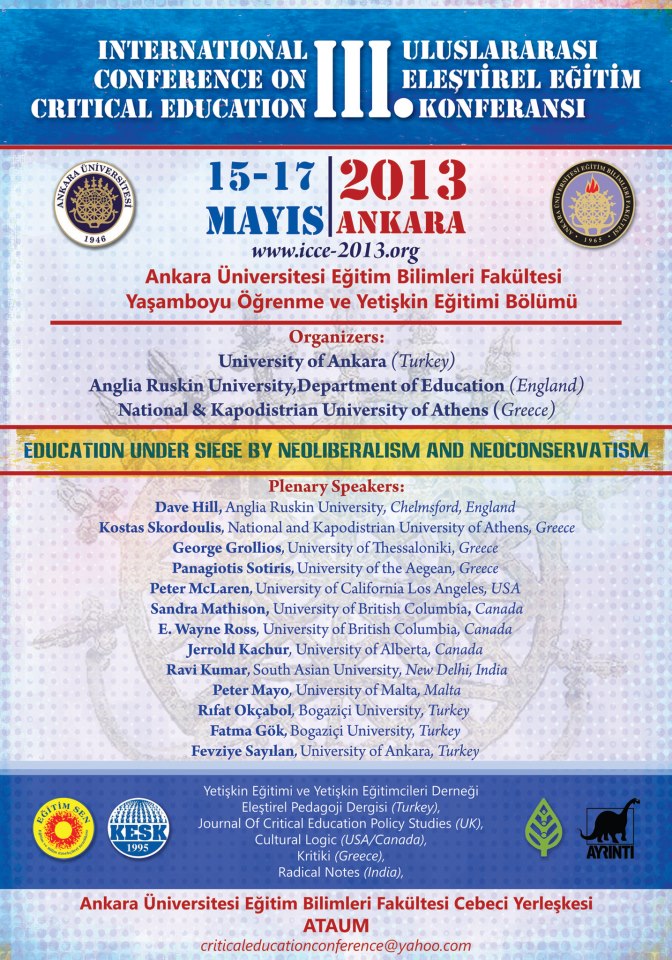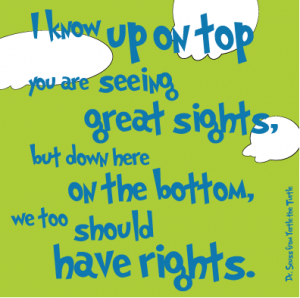The journals Cultural Logic and Works & Days are collaborating to co-publish special issues on “Marxism and Education: International Perspectives on Education for Revolution.”
The issue will be published this fall, in print, by Works & Days. Cultural Logic will then publish an expanded online version—including several additional articles, including pieces on Greece, India, and Turkey—in 2014.
Rich Gibson and E. Wayne Ross, co-editors of the special issue, describe the context and focus of the issue as:
The core issue of our time is the reality of the promise of perpetual war and escalating color-coded inequality met by the potential of a mass, activist, class-conscious movement to transform both daily life and the system of capitalism itself. In this context, schools in the empires of the world are the centripetal organizing points of much of life. While the claim of capitalist schooling is, in the classics, education, “leading out,” the reality is that schools are segregated illusion factories, in some cases human munition factories. Rather than leading out, they encapsulate.
Mainstream educational and social research typically ignores, disconnects, the ineluctable relationships of what is in fact capitalist schooling, class war, imperialist war, and the development of varying forms of corporate states around the world.
At issue, of course, is: What to do?
The long view, either in philosophy or social practice is revolution as things must change, and they will.
Connecting the long view to what must also be a long slog necessarily involves a careful look at existing local, national, and international conditions; working out tactics and strategies that all can understand, none taken apart from a grand strategy of equality and justice.
“Marxism and Education: Education for Revolution” will be the second collaborative publishing project between Cultural Logic and Works & Days. In 2012, the journals co-published the special issue “Culture and Crisis,” edited by Cultural Logic co-editor Joseph G. Ramsey) in print and online versions.
Table of Contents for Marxism and Education: International Perspectives on Education for Revolution
Marxist Sociology of Education and the Problem of Naturalism: An Historical Sketch
Grant Banfield, Flinders University of South Australia
The Illegitimacy of Student Debt
David J. Blacker, University of Delaware
A Tale of Two Cities – and States
Richard A. Brosio, University of Wisconsin Milwaukee
Schooling For Capitalism or Education for Twenty-First Century Socialism?
Mike Cole, University of East London
Barbarism Rising: Detroit, Michigan, and the International War of the Rich on the Poor
Rich Gibson, San Diego State University
Reimagining Solidarity: Hip-Hop as Revolutionary Pedagogy
Julie A. Gorlewski, State University of New York, New Paltz
Brad J. Porfilio, Lewis University
The Pedagogy of Excess
Deborah P. Kelsh, The College of Saint Rose
Contesting Production: Youth Participatory Action Research in the Struggle to Produce Knowledge
Brian D. Lozenski, University of Minnesota
Zachary A. Casey, University of Minnesota
Shannon K. McManimon, University of Minnesota
Undermining Capitalist Pedagogy: Takiji Kobayashi’s Tōseikatsusha and the Ideology of the World Literature Paradigm
John Maerhofer, Roger Williams University
Class Consciousness and Teacher Education: The Socialist Challenge and The Historical Context
Curry Stephenson Malott, West Chester University of Pennsylvania
Insurgent Pedagogies and Dangerous Citizenship
E. Wayne Ross, The University of British Columbia
Kevin D. Vinson, The University of The West Indies
Learning to be Fast Capitalists on a Flat World
Timothy Patrick Shannon, The Ohio State University
Patrick Shannon, Penn State University
Hacking Away at the Corporate Octopus
Alan J. Singer, Hofstra University
SDS, The 1960s, and Educating for Revolution
Alan J. Spector, Purdue University, Calumet
About the Co-editors:
Rich Gibson is emeritis professor of social studies in the College of Education at San Diego State University. He worked as a foundry worker, an ambulance driver, a pot and pan washer, fence painter, soda jerk, bank teller, surveyor’s assistant, assembly line chaser, a teacher, a social worker, organizer and bargaining agent for National Education Association, TA, and as a professor at Wayne State University. With about ten other people, he helped to found what is now the largest local in the UAW, local 6000, not auto-workers, but state employees.
E. Wayne Ross is professor in the Faculty of Education at the University of British Columbia and a former secondary social studies (Grades 8 to 12) and day care teacher in North Carolina and Georgia. He has taught at Ohio State University, State University of New York, and the University of Louisville. Ross is a member of the Institute for Critical Education Studies at UBC and co-editor of Critical Education and Workplace: A Journal for Academic Labor.
Gibson and Ross are co-editors of Neoliberalism and Education Reform (Hampton Press) and are co-founders of The Rouge Forum, a group of K-12 and university education workers, parents, community people, and students, engaged in fighting for a democratic and egalitarian society. Find out more about The Rouge Forum conferences here and here.
About Cultural Logic:
Cultural Logic—which has been on-line since 1997—is an open access, non-profit, peer-reviewed, interdisciplinary journal that publishes essays, interviews, poetry, reviews (books, films, other media), etc. by writers working within the Marxist tradition.
CL co-editors are: David Siar (Winston-Salem State University), Gregory Meyerson (North Carolina A & T University), James Neilson (North Carolina A & T University), Martha Gimenez, (University of Colorado), Rich Gibson (San Diego State University), E. Wayne Ross, (University of British Columbia), Joe Ramsey (Quincy College)
About Works & Days:
Works & Days provides a scholarly forum for the exploration of problems in cultural studies, pedagogy, and institutional critique, especially as they are impacted by the global economic crisis of late capitalism. Whereas most scholarly journals publish groups of relatively unrelated essays, each volume of Works & Days focuses on a specific issue, and contributors are encouraged to share their work with each other.
Recent special issues of the Works & Days journal have focused on the effect of globalization on women and the environment, the attacks on academic freedom, the privatization of higher education under neoliberal capitalism, the increasing exploitation of part-time, temporary faculty, the shift from print to electronic media, and the politics of knowledge.
Works & Days is edited by David B. Downing (Indiana University of Pennsylvania).


